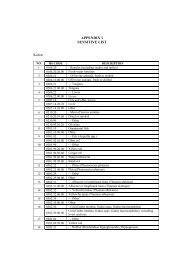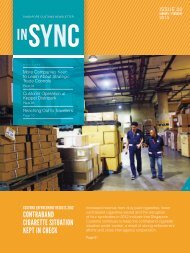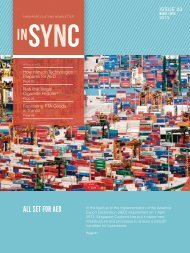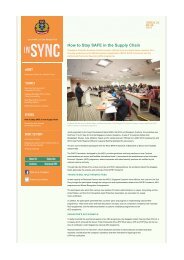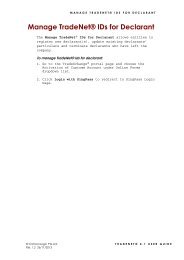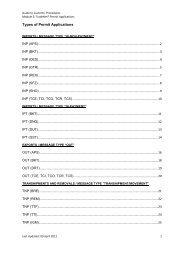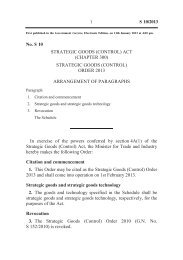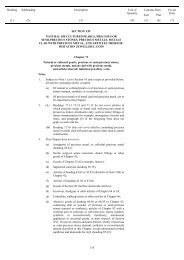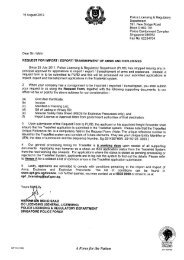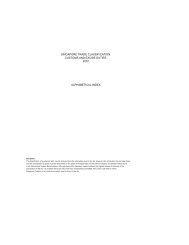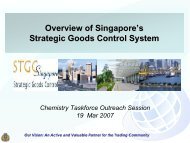InSYNC - Singapore Customs
InSYNC - Singapore Customs
InSYNC - Singapore Customs
Create successful ePaper yourself
Turn your PDF publications into a flip-book with our unique Google optimized e-Paper software.
inSYNC<br />
singapore customs newsletter • issue 20 • september / october 2012<br />
HIGHLIGHTS<br />
GST on Investment-Grade<br />
Precious Metals Lifted<br />
Global Competitiveness<br />
Report: <strong>Singapore</strong> is 1 st<br />
in <strong>Customs</strong> Efficiency<br />
Travellers Happier<br />
with <strong>Customs</strong><br />
Checkpoint Services<br />
Page 08 Page 08 Page 09<br />
Nurturing Green<br />
Technologies in<br />
<strong>Singapore</strong><br />
<strong>Singapore</strong> <strong>Customs</strong> proactively partners<br />
the business community in developing<br />
environmentally-friendly solutions for a<br />
sustainable future. This is done through<br />
a consultative approach and seeing the<br />
big picture when evaluating the impact of<br />
research and development (R&D) projects<br />
and other green initiatives.<br />
Page 01<br />
<strong>Singapore</strong> <strong>Customs</strong> Foils Attempts to Smuggle In<br />
Controlled Goods<br />
To ensure the integrity of the trading system, <strong>Singapore</strong> <strong>Customs</strong> adopts a risk<br />
assessment framework to identify ‘suspicious’ consignments for checks before<br />
they enter <strong>Singapore</strong>. Working closely with other controlling agencies, <strong>Singapore</strong><br />
<strong>Customs</strong> recently thwarted attempts by two importers to smuggle controlled goods<br />
into the country.<br />
Page 04
II<br />
CONTENTS<br />
FEATURES<br />
inSIGHT<br />
Protecting <strong>Singapore</strong>’s Reputation as a Global<br />
Trading Hub<br />
As the guardian of <strong>Singapore</strong>’s trade system, <strong>Singapore</strong><br />
<strong>Customs</strong> is tasked with the roles of trade facilitator as well<br />
as trade regulator. While facilitating trade and enforcing<br />
regulations to protect revenue may appear contradictory,<br />
a risk-based approach allows the department to achieve both<br />
objectives without compromising on either.<br />
To ensure the integrity of the trading system, <strong>Singapore</strong><br />
<strong>Customs</strong> officers, working together with other controlling<br />
agencies, targets high-risk consignments for checks. This<br />
curbs the movement of illegal goods while ensuring that<br />
legitimate goods flow in and out of <strong>Singapore</strong> smoothly. Read<br />
our feature story to find out how <strong>Singapore</strong> <strong>Customs</strong> recently<br />
foiled two attempts by importers to smuggle controlled goods.<br />
The trade regulation and trade facilitation measures can work<br />
well together, as evidenced by <strong>Singapore</strong>’s top performance<br />
in global rankings in logistics and trade. Most recently,<br />
<strong>Singapore</strong>’s customs procedures were ranked as the most<br />
efficient out of 144 economies in World Economic Forum’s<br />
Global Competitiveness Report. In addition, the agency’s<br />
annual Travellers’ Satisfaction Survey 2011 results show that<br />
travellers are happier with <strong>Singapore</strong> <strong>Customs</strong>’ services at<br />
the checkpoints: their overall satisfaction increased from<br />
91 per cent in 2010 to 95 per cent in 2011.<br />
<strong>Singapore</strong> <strong>Customs</strong> will continue to partner the trading<br />
community and uphold our laws to build trust, facilitate<br />
trade and protect revenue.<br />
Tan Zi Jie<br />
Editor<br />
01<br />
04<br />
07<br />
08<br />
08<br />
09<br />
10<br />
11<br />
12<br />
13<br />
Nurturing Green Technologies in <strong>Singapore</strong><br />
<strong>Singapore</strong> <strong>Customs</strong> Foils Attempts to Smuggle<br />
In Controlled Goods<br />
Securing the Movement of Hazardous Chemicals<br />
GST on Investment-Grade Precious Metals Lifted<br />
Global Competitiveness Report:<br />
<strong>Singapore</strong> is 1 st in <strong>Customs</strong> Efficiency<br />
Travellers Happier with <strong>Customs</strong><br />
Checkpoint Services<br />
Strengthening Regional Ties through<br />
Learning and Cooperation<br />
Partners in Border Security and<br />
Trade Facilitation<br />
Working and Playing as a Family<br />
Training Calendar / Event Highlights<br />
DESIGN BY<br />
Green House Design + Communications<br />
Please let us know what you think of inSYNC.<br />
We welcome your ideas on what you would like to<br />
see and how we can do better. Write in to the Editor<br />
at customs_media@customs.gov.sg<br />
To read, download or subscribe to the online edition<br />
of inSYNC, please visit www.customs.gov.sg/insync<br />
http://www.facebook.com/<strong>Singapore</strong><strong>Customs</strong><br />
<strong>InSYNC</strong> is a publication of <strong>Singapore</strong> <strong>Customs</strong>. Copyright of the<br />
materials contained in this publication belongs to <strong>Singapore</strong> <strong>Customs</strong>.<br />
Nothing in here shall be reproduced in whole or in part without<br />
prior written consent of <strong>Singapore</strong> <strong>Customs</strong>. All rights reserved.<br />
All information is correct at time of publication.
FEATURES 01<br />
Nurturing Green Technologies<br />
in <strong>Singapore</strong><br />
<strong>Singapore</strong> <strong>Customs</strong> proactively partners the business community in developing<br />
environmentally-friendly solutions for a sustainable future. This is done<br />
through a consultative approach and seeing the big picture when evaluating the<br />
impact of research and development (R&D) projects and other green initiatives.<br />
As dealing with climate change becomes<br />
a global imperative, the movement<br />
to develop environmentally-friendly<br />
solutions is gaining momentum.<br />
Around the world, industries, companies<br />
and governments are betting on<br />
innovative technologies to build a<br />
sustainable future.<br />
Recognising the importance of such<br />
initiatives, <strong>Singapore</strong> <strong>Customs</strong> makes<br />
it easier for the business community to<br />
conduct green activities. This is done<br />
through a range of trade facilitation<br />
schemes such as the Temporary Import<br />
Scheme and the granting of Goods<br />
and Services Tax (GST) relief and duty<br />
exemptions on a case-by-case basis.<br />
Recently, <strong>Singapore</strong> <strong>Customs</strong> facilitated<br />
two such R&D projects: the import of 11<br />
micro-electric vehicles for a study trial on<br />
eco-friendly modes of transport, and of<br />
a prototype bench plant for research on<br />
turning waste tyres into useful products.<br />
Beyond providing monetary savings,<br />
these facilitations help to advance the<br />
development of new technologies such<br />
as alternative urban transport systems<br />
and waste disposal solutions to<br />
reduce pollution.<br />
Test Driving Eco-Cars in NUS<br />
The study conducted jointly by Toyota<br />
Tsusho Asia Pacific and National<br />
University of <strong>Singapore</strong> (NUS) tests the<br />
feasibility of green mobility vehicles for<br />
short-distance travel.
02<br />
FEATURES<br />
The two-year trial involves testing 11<br />
micro-electric vehicles on the roads<br />
within the University Town and Kent<br />
Ridge campus. Faculty staff and students<br />
will share and use the vehicles as<br />
personal transport to commute within<br />
the campus.<br />
The micro-electric vehicles are singleseater<br />
cars that run on electricity from<br />
lead acid batteries rather than fossil<br />
fuels. As the NUS campus is a selfcontained<br />
township, the area will be<br />
transformed into a ‘living laboratory’.<br />
Researchers will be able to review the<br />
viability of introducing the vehicles in an<br />
urban environment.<br />
“The results from the trial can be<br />
expanded in a measured manner to<br />
future and radical city or township<br />
planning,” said Associate Professor Tan<br />
Kok Kiong from NUS Department of<br />
Electrical and Computer Engineering.<br />
As part of the study, TTAP had to import<br />
the 11 micro-electric vehicles from<br />
Japan. In normal circumstances, each<br />
imported vehicle will be subject to an<br />
ad-valorem excise duty which is 20 per<br />
cent of the vehicle’s transaction value.<br />
Generally, vehicles used for R&D<br />
studies are eligible for facilitation under<br />
the Transport Technology Innovation and<br />
Development Scheme (TIDES-PLUS)<br />
administered by the Land Transport<br />
Authority (LTA) and Economic<br />
Development Board (EDB). The scheme<br />
grants the exemption of excise duties<br />
along with waiver of other taxes.<br />
The challenge, however, was that the<br />
micro-electric vehicles are not eligible<br />
for TIDES-PLUS as they are not<br />
constructed for public road use<br />
in <strong>Singapore</strong>.<br />
As such, <strong>Singapore</strong> <strong>Customs</strong> worked with<br />
public agencies such as LTA and EDB to<br />
look into creative ways to facilitate<br />
the study.<br />
Recognising the project’s merits in<br />
contributing to eco-friendly urban<br />
transport systems and sustainable city<br />
planning research, <strong>Singapore</strong> <strong>Customs</strong><br />
decided to waive the excise duties for the<br />
11 vehicles in June 2012.<br />
The waiver helped TTAP to save nearly<br />
S$50,000 in duties altogether. The<br />
earnings derived can go towards other<br />
developmental activities for the project.<br />
Photo: TTAP<br />
Photo: Leong Mun Wai<br />
NUS faculty and staff will travel within the University Town (above) and Kent Ridge campus in duty-exempted micro-electric vehicles for a study on green transportation for short distances.
FEATURES 03<br />
Turning Waste Tyres into Energy<br />
Rubber tyres that are damaged or have<br />
lost their traction are usually dumped in<br />
landfill sites. To combat such pollution,<br />
an environmental solutions company<br />
has come up with a way to convert waste<br />
tyres into useful products instead.<br />
Using special induction heating<br />
technology, rubber powder from waste<br />
tyres is processed into energy and carbon<br />
black. The first of its kind, this innovative<br />
process is pioneered by AEL Enviro<br />
(Asia) and carried out by its prototype<br />
bench plant, which was built in its<br />
California facility by plasma science and<br />
engineering experts.<br />
Looking to further improve the<br />
technology and achieve higher efficiency<br />
in their outputs, AEL Enviro (Asia) wanted<br />
to import the bench plant to <strong>Singapore</strong><br />
for continued testing and development.<br />
Photo: AEL Enviro (Asia)<br />
With the research from this project, the<br />
company aims to establish a commercial<br />
plant in <strong>Singapore</strong> in the next two years.<br />
“With the large-scale plant, we plan to<br />
create a <strong>Singapore</strong> brand and market the<br />
technology to the world using <strong>Singapore</strong><br />
as a base,” said Mr Tan Hiang Mong,<br />
Chief Operations Officer of AEL<br />
Enviro (Asia).<br />
Normally, goods imported for<br />
exhibition, repair, testing, experiment<br />
or demonstration can be brought into<br />
<strong>Singapore</strong> under the Temporary Import<br />
Scheme. Duty and GST on the goods<br />
will not need to be paid if they are to<br />
be re-exported within six months of<br />
import. This excludes liquor and<br />
tobacco products.<br />
The problem, however, was that<br />
the bench plant would need to be in<br />
<strong>Singapore</strong> for over 24 months. The extra<br />
time is needed to refine the technology<br />
and fine-tune the commercial<br />
plant’s design.<br />
While the longer period of import means<br />
it would not normally qualify for the<br />
Temporary Import Scheme, <strong>Singapore</strong><br />
<strong>Customs</strong> recognises the importance<br />
of balancing regulatory controls with a<br />
pro-enterprise mindset. With its eye on<br />
the bigger picture, <strong>Singapore</strong> <strong>Customs</strong><br />
understands that supporting innovative<br />
AEL Enviro (Asia)’s prototype bench plant can process waste tyres into useful products such as energy and carbon black.<br />
ideas today will bring about greater<br />
rewards for tomorrow.<br />
In assessing the situation, officers from<br />
different branches in <strong>Singapore</strong> <strong>Customs</strong>,<br />
in close collaboration with EDB, took<br />
into account the project’s merits.<br />
Importing the bench plant will lead<br />
to the development of waste disposal<br />
technologies while the commercial plant<br />
will contribute to <strong>Singapore</strong>’s economy.<br />
Thus, <strong>Singapore</strong> <strong>Customs</strong> decided to<br />
provide a special GST waiver for the<br />
bench plant, which helped the company<br />
save over S$44,000 in GST.<br />
Photo: AEL Enviro (Asia)<br />
“We would like to thank <strong>Singapore</strong><br />
<strong>Customs</strong> and the authorities for providing<br />
opportunities not seen elsewhere in the<br />
region. The bench plant is a big capital<br />
investment for a small, newly-setup<br />
company like AEL Enviro (Asia) to prove<br />
its technology concept,” said Mr Tan.<br />
“The GST waiver helps to free up much<br />
needed funds, for us to take the next step<br />
in this R&D effort,” he added.
04<br />
FEATURES<br />
<strong>Singapore</strong> <strong>Customs</strong> Foils<br />
Attempts to Smuggle In<br />
Controlled Goods<br />
To ensure the integrity of the trading system, <strong>Singapore</strong> <strong>Customs</strong> adopts<br />
a risk assessment framework to identify ‘suspicious’ consignments for<br />
checks before they enter <strong>Singapore</strong>. Working closely with other controlling<br />
agencies, <strong>Singapore</strong> <strong>Customs</strong> recently thwarted attempts by two importers<br />
to smuggle controlled goods into the country.<br />
Over 5,600 pieces of snake skin were seized from a consignment originating from Batam, Indonesia.
FEATURES 05<br />
An importer thought he could skirt the law by smuggling in<br />
snake skins and falsely declaring them as jackets. In another<br />
case, a uniform manufacturer tried to sneak illegal soil into<br />
<strong>Singapore</strong>, among its usual shipment of textile materials<br />
and umbrellas.<br />
What these importers did not know was that <strong>Singapore</strong><br />
<strong>Customs</strong> officers were already tracking their<br />
‘suspicious’ consignments.<br />
<strong>Singapore</strong> <strong>Customs</strong> worked closely with the Immigration<br />
& Checkpoints Authority (ICA) to intercept the two targeted<br />
consignments at the checkpoints. These cases are currently<br />
being investigated by the Agri-Food & Veterinary Authority (AVA).<br />
ASSESSING CARGO RISKS<br />
Risk assessment is a cornerstone in ensuring trade security.<br />
By proactively sifting out high-risk consignments before they<br />
come into <strong>Singapore</strong>, <strong>Singapore</strong> <strong>Customs</strong> keeps a tight control<br />
on illegal cargo while facilitating the smooth flow of legitimate<br />
goods in and out of the country.<br />
Risk assessment officers from <strong>Singapore</strong> <strong>Customs</strong> work<br />
closely with controlling agencies such as the AVA, Health<br />
Sciences Authority (HSA) and the National Environment Agency<br />
(NEA) to deter and apprehend traders who violate import and<br />
export regulations. Controlling agencies are the authorities<br />
that provide permission for the import of controlled goods<br />
like pharmaceuticals and animal products. The whole-ofgovernment<br />
approach enables a comprehensive response to<br />
complex enforcement challenges.<br />
In 2011, the collaboration between agencies led to the detection<br />
of an NEA case involving lead battery waste falsely declared<br />
as scrap metal, and a HSA case involving sex drugs falsely<br />
declared as toys.<br />
LARGEST SHIPMENT OF ILLEGAL SNAKE SKINS IN<br />
FIVE YEARS<br />
On 7 August 2012, <strong>Singapore</strong> <strong>Customs</strong> and ICA officers thwarted<br />
an attempt to illegally import more than 5,600 pieces of snake<br />
skin into <strong>Singapore</strong>. This is the largest consignment of snake<br />
skin uncovered by <strong>Singapore</strong> authorities in five years.<br />
<strong>Singapore</strong> <strong>Customs</strong> identified a consignment declared as<br />
jackets imported from Batam, Indonesia, for examination.<br />
ICA officers conducted checks on the lorry carrying the goods<br />
at Jurong Scanning Station and uncovered four bales of<br />
snake skin.<br />
The consignment included 5,634 pieces of python, cobra,<br />
oriental rat snake and water snake skins and had a street value<br />
of nearly S$5,000. Of these, over 2,100 pieces (python, oriental<br />
rat snake and cobra skins) are protected under the Convention<br />
on International Trade in Endangered Species of Wild Fauna<br />
and Flora (CITES). <strong>Singapore</strong> is a signatory of the treaty,<br />
which protects endangered species through the imposition<br />
of trade restrictions.<br />
Under <strong>Singapore</strong>’s Endangered Species (Import and Export)<br />
Act, the export and import of snake skins protected under<br />
Four species of snake skins were found. From top: python, oriental rat snake, cobra and water<br />
snake skins. The first three species are endangered and protected by law.<br />
the Convention must be accompanied by CITES permits from<br />
the exporting and importing countries, which is issued by AVA<br />
in <strong>Singapore</strong>.<br />
As it is an offence to import or export CITES-protected species<br />
without a permit from AVA, offenders can be fined up to<br />
$500,000, jailed for up to two years, or both.
06<br />
FEATURES<br />
ILLEGAL IMPORT OF SOIL<br />
<strong>Singapore</strong> <strong>Customs</strong> targeted for examination a container from<br />
Huangpu, China, that was declared to contain textile material<br />
and umbrellas by a uniform manufacturer. When ICA officers<br />
intercepted the 20-foot container at Tanjong Pagar Gate on<br />
22 August 2012, they discovered something else.<br />
A total of 823 bags of soil, commonly used for growing plants,<br />
were found in the container.<br />
The import of soil into <strong>Singapore</strong> is regulated under the<br />
Control of Plants Act – Plant Importation Rules. Under the Act,<br />
the import of soil must be covered by a valid import permit<br />
issued by AVA. A phytosanitary certificate from the exporting<br />
country is also required to certify that the soil is free from any<br />
plant parasites and pests, to prevent their introduction<br />
into <strong>Singapore</strong>.<br />
Failure to comply with these requirements can lead to a<br />
$10,000 fine and/or imprisonment of up to three years.<br />
The illegal bags of soil were found in a container with textile material and umbrellas.<br />
A uniform manufacturer tried to smuggle 823 bags of soil from Huangpu, China, into <strong>Singapore</strong>.
UPDATES<br />
07<br />
Securing the Movement of<br />
Hazardous Chemicals<br />
To better support <strong>Singapore</strong>’s vital energy and chemicals industry and its Jurong<br />
Island hub, <strong>Singapore</strong> <strong>Customs</strong> facilitates the set-up of Jurong Island Terminal<br />
— an innovative terminal which enables the secured movement of hazardous<br />
chemicals between mainland <strong>Singapore</strong> and Jurong Island by sea.<br />
<strong>Singapore</strong> <strong>Customs</strong>, working closely with a multi-agency team,<br />
authorises the movement of petrochemical products at the new<br />
Jurong Island Terminal (JIT).<br />
JIT is an innovative solution to the congestion and safety<br />
challenges posed by the expected increase in cargo traffic<br />
between the two islands.<br />
The Challenge<br />
Home to almost 100 global petroleum, petrochemical and<br />
specialty chemical companies, Jurong Island is the centrepiece<br />
of <strong>Singapore</strong>’s leading integrated energy and chemicals hub.<br />
The island is a key contributor to <strong>Singapore</strong>’s economy. As of<br />
2011, it has drawn cumulative fixed asset investments of over<br />
S$30 billion and employs about 8,000 workers.<br />
Prior to the construction of JIT, containerised petrochemicals<br />
were transported to and from the PSA terminals on mainland<br />
<strong>Singapore</strong> and Jurong Island via road. A single causeway links<br />
Jurong Island with the mainland.<br />
In the next few years, the number of chemical projects on<br />
Jurong Island is expected to increase to support the thriving<br />
energy and chemicals industry.<br />
Problem:<br />
Solution:<br />
Jurong<br />
Island<br />
Jurong Island<br />
Terminal<br />
Jurong<br />
Island<br />
Jurong Island<br />
Terminal<br />
<strong>Singapore</strong><br />
PSA Terminals<br />
<strong>Singapore</strong><br />
PSA Terminals<br />
With more chemical projects, the volume of containerised<br />
petrochemicals being transported between the islands is<br />
expected to rise. This will worsen traffic congestion in and<br />
out of the single causeway linking Jurong Island with the<br />
mainland. In addition, as the roads run through residential and<br />
commercial areas, the security and safety of members of the<br />
public may be compromised.<br />
A Tailored Solution<br />
Always a step ahead, the <strong>Singapore</strong> government recognised<br />
the potential challenges early on. A multi-agency team, which<br />
included Jurong Town Corporation, <strong>Singapore</strong> <strong>Customs</strong>,<br />
Ministry of Home Affairs, <strong>Singapore</strong> Police Force and the<br />
Immigration & Checkpoints Authority, was formed in late<br />
2008 to overcome these limitations while ensuring trade<br />
and border security. The aim was to manage the road traffic<br />
situation without introducing additional layers to the current<br />
screening procedures.<br />
Benefits of JIT:<br />
1. Reduce traffic congestion in and out of the Jurong Island causeway<br />
2. Ensure public safety for commercial and residential areas<br />
The multi-agency team worked closely with the terminal’s<br />
operator PSA to facilitate its smooth operations. JIT handled<br />
its first shipments of petrochemical-laden ISO tanks on<br />
25 June 2012.<br />
With JIT, petrochemical materials can now be transported from<br />
PSA terminals on the main island to Jurong Island via barges on<br />
the sea. The alternative sea route eases traffic congestion at the<br />
Jurong Island causeway.<br />
Public safety is also enhanced with JIT, as the sea route<br />
enables the loads of hazardous petrochemicals to safely bypass<br />
residential and commercial areas on the main island.
08 UPDATES<br />
GST on Investment-Grade<br />
Precious Metals Lifted<br />
From 1 October 2012, investment-grade gold, silver and platinum will<br />
no longer be subject to 7 per cent Goods and Services Tax (GST), as<br />
announced in this year’s Budget by the Minister for Finance.<br />
The move is a key measure to boost<br />
investment-grade precious metals (IPM)<br />
refining and trading in <strong>Singapore</strong>.<br />
<strong>Singapore</strong> <strong>Customs</strong>, working with other<br />
government agencies like International<br />
Enterprise <strong>Singapore</strong>, Inland Revenue<br />
Authority of <strong>Singapore</strong> and Ministry of<br />
Finance, facilitates the implementation<br />
of this scheme.<br />
To bring IPM into the country, traders<br />
need to make a customs declaration<br />
through TradeNet before importation.<br />
The rationale behind the move is to put<br />
the GST treatment on par with other<br />
actively-traded financial assets such as<br />
stocks and bonds. The GST exemption<br />
aligns <strong>Singapore</strong>’s treatment of IPM<br />
with the practices of Australia, UK<br />
and Switzerland.<br />
Internationally, the market for IPM<br />
has been expanding. In 2011, the<br />
global demand for gold, worth about<br />
US$205.5 billion, grew by 0.4 per cent.<br />
The growth was largely driven by<br />
investment demand from Asia. <strong>Singapore</strong><br />
aims to grow its share of the global gold<br />
trading market from 2 per cent to 10-15<br />
per cent in the next five to ten years.<br />
To qualify for the exemption, IPM must<br />
be of a minimum purity and satisfy<br />
certain requirements to be categorised<br />
as investment-grade. For example,<br />
IPM must be tradeable on the<br />
international bullion market and bear<br />
an internationally-accepted identification<br />
that guarantees its quality.<br />
Concurrently, 1 October 2012 saw the<br />
introduction of the Approved Refiner<br />
and Consolidator Scheme (ARCS) to<br />
ease cash flow for IPM refiners and<br />
local consolidators, with regards to GST<br />
payment on the import and purchase of<br />
raw materials and input tax relief. The<br />
scheme is administered by the Inland<br />
Revenue Authority of <strong>Singapore</strong> (IRAS).<br />
For more details on the import of<br />
IPM, refer to Circular No.12/2012 at<br />
www.customs.gov.sg<br />
For more details on the Approved<br />
Refiner and Consolidator Scheme<br />
(ARCS), please refer to<br />
www.iras.gov.sg<br />
Global Competitiveness Report:<br />
<strong>Singapore</strong> is 1 st in <strong>Customs</strong> Efficiency<br />
Over 14,000 business<br />
executives worldwide<br />
named <strong>Singapore</strong>’s<br />
customs procedures as<br />
the most efficient in<br />
the World Economic<br />
Forum (WEF) Global<br />
Competitiveness Report<br />
2012-2013.<br />
<strong>Singapore</strong> beat 143 other economies to<br />
be ranked as having the “highest level of<br />
efficiency of customs procedures related<br />
to the entry and exit of merchandise” in<br />
WEF’s Executive Opinion Survey.<br />
<strong>Singapore</strong>’s customs efficiency has<br />
been consistently topping the global<br />
competitiveness report. It clinched first<br />
position in WEF reports in 2008-2009,<br />
second in 2009-2010, and regained the<br />
first position in 2010-11.<br />
Overall, WEF placed <strong>Singapore</strong> as the<br />
second most competitive economy behind<br />
Switzerland. <strong>Singapore</strong> also excelled<br />
in other indicators; it had the best<br />
public and private institutions, most<br />
efficient goods and labour markets<br />
and came in second for world-class<br />
infrastructure and financial<br />
market development.<br />
The WEF report is based on a<br />
comprehensive set of micro- and<br />
macro-economic indicators, such<br />
as publicly available data and the<br />
opinion survey of over 14,000<br />
business leaders.
UPDATES<br />
09<br />
Travellers Happier with<br />
<strong>Customs</strong> Checkpoint Services<br />
Results from the <strong>Singapore</strong> <strong>Customs</strong> Travellers’ Satisfaction Survey<br />
2011 show that the agency has improved its services. The yearly survey<br />
revealed a 4 per cent rise in overall traveller satisfaction from 91 per cent<br />
in 2010 to 95 per cent in 2011.<br />
This means that more than nine out<br />
of ten travellers surveyed ranked our<br />
services a four or five on a five-point<br />
scale, indicating that they were satisfied<br />
or very satisfied with <strong>Singapore</strong><br />
<strong>Customs</strong>’ services.<br />
The annual survey evaluates <strong>Customs</strong><br />
processes at various checkpoints<br />
and identifies gaps between traveller<br />
expectations and actual levels of service.<br />
It enables <strong>Singapore</strong> <strong>Customs</strong> to<br />
determine specific service needs and<br />
expectations of travellers, and gather<br />
suggestions for improvements.<br />
Travellers were asked to rate the Goods<br />
and Services Tax (GST) refund and duty<br />
payment process, from locating the<br />
refund or tax counters, information<br />
provided on obtaining a refund, to the<br />
service received at the counter. In<br />
addition, the service attributes of the<br />
officers – professionalism, level of<br />
courtesy, clarity of information<br />
provided, knowledge and speed –<br />
were also assessed.<br />
In general, travellers were satisfied<br />
with the performance of <strong>Singapore</strong><br />
<strong>Customs</strong> officers.<br />
Those who travelled by air were the most<br />
satisfied (96 per cent) while seafarers<br />
were the least (84 per cent). Of those who<br />
travelled by land, 94 per cent said they<br />
were happy with <strong>Customs</strong> services.<br />
The data was collected through face-toface<br />
interviews with tourists, visitors,<br />
residents, commuters and <strong>Singapore</strong>ans<br />
at 22 <strong>Customs</strong> contact points. Carried out<br />
over a six-month period straddling 2011<br />
and 2012, the survey comprised 4,382<br />
responses from travellers who came to<br />
<strong>Singapore</strong> by air, land and sea.<br />
The annual Travellers’ Satisfaction<br />
Survey is just one of the tools <strong>Singapore</strong><br />
<strong>Customs</strong> employs in its efforts to excel<br />
in customer service. In addition, the<br />
agency frequently sends its officers<br />
for training in service excellence and<br />
innovation. Recently, it revised its Service<br />
Charter and launched a <strong>Singapore</strong><br />
<strong>Customs</strong> Service Book with anecdotes of<br />
exemplary service to motivate officers.
10 UPDATES<br />
Strengthening Regional<br />
Ties through Learning<br />
and Cooperation<br />
<strong>Singapore</strong> <strong>Customs</strong> frequently engages its counterparts to keep abreast of<br />
the latest developments and exchange experiences. In addition to hosting<br />
foreign administrations, <strong>Singapore</strong> <strong>Customs</strong> recently visited Thailand<br />
and Guangzhou <strong>Customs</strong> to learn about their procedures and discuss the<br />
newly-signed China-<strong>Singapore</strong> supply chain security arrangement.<br />
GAINING INSIGHTS FROM<br />
THAILAND CUSTOMS<br />
From 21 to 22 August 2012, a <strong>Singapore</strong><br />
<strong>Customs</strong> delegation, led by Director-<br />
General of <strong>Customs</strong> Fong Yong Kian,<br />
visited the Thailand <strong>Customs</strong> Department.<br />
They were warmly received by Thailand<br />
<strong>Customs</strong> Director-General Somchai<br />
Poolsavasdi, Principal Adviser<br />
Chawewan Kongcharoenkitkul<br />
and other senior officials.<br />
The delegation visited Western Digital<br />
(Thailand) to learn about an electronic<br />
tracking system the company developed<br />
with Thailand <strong>Customs</strong> to facilitate and<br />
track the movement of vehicles between<br />
various zones in Bangkok, including to<br />
and from the airport. The tracking system<br />
uses radio-frequency identification<br />
(RFID), global positioning system (GPS)<br />
and general packet radio service<br />
(GPRS) technologies.<br />
<strong>Singapore</strong> <strong>Customs</strong> officers also<br />
observed customs operations at the<br />
Suvarnabhumi Airport and Laem<br />
Chabang Port.<br />
DISCUSSING SINGAPORE-CHINA MRA<br />
PILOT WITH GUANGZHOU CUSTOMS<br />
In June 2012, <strong>Singapore</strong> <strong>Customs</strong> and<br />
General Administration of China <strong>Customs</strong><br />
signed a mutual recognition arrangement<br />
(MRA) of Authorised Economic Operator<br />
(AEO) Programmes to enhance supply<br />
chain security. Under the MRA, certified<br />
AEO companies in both countries are<br />
mutually recognised and can enjoy<br />
greater customs facilitation on<br />
both sides.<br />
To test out and fine-tune the MRA<br />
implementation procedures, <strong>Singapore</strong><br />
<strong>Customs</strong> and Guangzhou <strong>Customs</strong><br />
started a pilot on 1 September 2012,<br />
before the MRA is fully operationalised in<br />
the rest of China.<br />
Director-General of <strong>Customs</strong>, Mr Fong,<br />
and the <strong>Singapore</strong> <strong>Customs</strong> delegation<br />
visited the Guangzhou <strong>Customs</strong> District<br />
of China on 23 and 24 August 2012, ahead<br />
of the pilot. They were warmly received<br />
by Deputy Director-General Lai Shujia of<br />
Guangzhou <strong>Customs</strong>.<br />
Both sides discussed how AA-rated<br />
companies under China <strong>Customs</strong>’<br />
Measure of Classified Management to<br />
Enterprise (MCME) programme would<br />
enjoy greater benefits if they were<br />
importing goods from a <strong>Singapore</strong><br />
exporter under <strong>Singapore</strong> Custom’s<br />
Secure Trade Partnership Plus<br />
(STP-Plus) programme.<br />
The <strong>Singapore</strong> <strong>Customs</strong> delegation also<br />
visited Guangzhou’s Baiyun International<br />
Airport and FedEx’s Asia Pacific Hub<br />
at the airport where they were briefed<br />
on customs procedures put in place to<br />
facilitate trade.<br />
The <strong>Singapore</strong> <strong>Customs</strong> delegation, led by Director-General<br />
Fong Yong Kian (second from left), visited Laem Chabang<br />
Port in Thailand, where they were briefed on port operations.<br />
Deputy Director-General Lai Shujia (left) of Guangzhou<br />
<strong>Customs</strong> District of China hosted <strong>Singapore</strong> <strong>Customs</strong><br />
Director-General Fong Yong Kian and officials from<br />
23 to 24 August 2012.
INSIDE CUSTOMS 11<br />
Partners in Border Security<br />
and Trade Facilitation<br />
As part of ongoing efforts to forge closer relationships with partner agencies,<br />
<strong>Singapore</strong> <strong>Customs</strong> invited Mr Clarence Yeo, Commissioner of Immigration &<br />
Checkpoints Authority (ICA) and his senior management to visit <strong>Singapore</strong><br />
<strong>Customs</strong> headquarters on 27 August 2012.<br />
Commissioner of ICA Clarence Yeo (seated, fourth from the left) and his senior management team paid a visit to <strong>Singapore</strong> <strong>Customs</strong> on 27 August 2012.<br />
During the visit hosted by Director-<br />
General of <strong>Customs</strong> Fong Yong Kian and<br />
members of the senior management<br />
team, representatives from <strong>Customs</strong> and<br />
ICA discussed issues of mutual interest<br />
and <strong>Singapore</strong> <strong>Customs</strong> shared on its<br />
work plans for the current financial year.<br />
<strong>Singapore</strong> <strong>Customs</strong> and ICA enjoy a<br />
very close and significant partnership<br />
that extends to multiple aspects of<br />
both agencies’ work. This leadership<br />
visit is one of the ways in which the<br />
two agencies share perspectives,<br />
expertise and experiences.<br />
After the reconstitution of the <strong>Customs</strong><br />
and Excise Department in 2003, ICA<br />
became the agency responsible for the<br />
security of <strong>Singapore</strong>’s borders against<br />
the entry of undesirable persons and<br />
cargo through <strong>Singapore</strong>’s air, land<br />
and sea checkpoints, and performs<br />
immigration and registration functions.<br />
On the other hand, <strong>Singapore</strong><br />
<strong>Customs</strong> became the lead agency<br />
on trade facilitation and revenue<br />
enforcement, responsible for<br />
implementing customs and traderelated<br />
enforcement measures.<br />
Given their complementary roles, the two<br />
agencies have been working closely to<br />
ensure that <strong>Singapore</strong> has a seamless<br />
customs and checkpoints regime.<br />
An efficient and progressive customs and<br />
checkpoints system is the key ingredient<br />
in a global trade and logistics hub like<br />
<strong>Singapore</strong>. Earlier this year, <strong>Singapore</strong><br />
topped international rankings such as<br />
World Bank’s Logistics Performance<br />
Index and the World Economic Forum’s<br />
Enabling Trade Index. This would not<br />
have been possible without the continued<br />
commitment of partner agencies to work<br />
closely with one another.
12 INSIDE CUSTOMS<br />
Working and Playing<br />
as a Family<br />
On 7 September 2012, <strong>Singapore</strong> <strong>Customs</strong> staff and their families had double<br />
the fun at the Tots@Work and Fun’Dival events, contributing to a good cause<br />
while letting their hair down.<br />
KIDS AT WORK<br />
“What is this world?” Four-year-old<br />
Ashton Chng asked in wonder as he<br />
stepped into the level six offices at<br />
Revenue House, clutching the hand<br />
of his mother Ms Angie Teo, Head of<br />
Organisational Excellence and<br />
Planning Branch.<br />
The ”world” was <strong>Singapore</strong> <strong>Customs</strong><br />
headquarters, and the occasion was the<br />
annual Tots@Work event, a boisterous<br />
affair where <strong>Customs</strong> staff brought their<br />
children to work for an afternoon of fun<br />
and games.<br />
Besides touring the offices, the little ones<br />
were treated to story-telling, sand-art,<br />
balloon-sculpting, face-painting and even<br />
a workshop on managing money. Staff<br />
also brought their spouses and family<br />
members to take part in the festivities.<br />
<strong>Singapore</strong> <strong>Customs</strong> staff came up with simple games such as plasticine-moulding for the little ones when they toured the<br />
offices on three levels.<br />
CHARITY BAZAAR<br />
While the kids made merry with their<br />
families, other <strong>Customs</strong> staff were not<br />
left out. Beside Tots@Work, the Fun’Dival<br />
charity bazaar was held to raise funds for<br />
The Straits Times School Pocket Money<br />
Fund for the second year running.<br />
<strong>Customs</strong> staff based in different locations,<br />
such as the various checkpoints and<br />
<strong>Customs</strong> Operations Command at Keppel<br />
Road, joined forces to set up stalls selling<br />
snacks and offering games such as<br />
mini-golf. Some even showcased their<br />
entrepreneurial skills, enlisting the help<br />
of children to charm staff into buying<br />
packets of sweets and stationery.<br />
Over $3,200 was raised for charity.<br />
The events transformed the usually<br />
quiet offices of <strong>Singapore</strong> <strong>Customs</strong> into a<br />
buzzing hive of activities. The atmosphere<br />
<strong>Singapore</strong> <strong>Customs</strong> raised over $3,200 for The Straits Times School Pocket Money Fund through a charity bazaar.<br />
was warm and convivial as staff played<br />
with their colleagues’ children while<br />
trading parenting tips.<br />
Such activities are organised to foster<br />
family and staff bonding. In <strong>Singapore</strong><br />
<strong>Customs</strong>, work-life harmony is at the<br />
core of its desired organisational culture<br />
and is supported by a holistic framework<br />
of human resource policies. For<br />
example, staff can opt for flexible-work<br />
arrangements like working from home,<br />
take half an hour off for exercise once a<br />
week, and benefit from exam leave if they<br />
are doing part-time studies.
INSIDE CUSTOMS<br />
13<br />
TRAINING CALENDAR<br />
Programme<br />
SC100 Basics of Every Declarant<br />
This three-day course provides trade declarants with an<br />
overview of customs procedures pertaining to the import and<br />
export of goods, the basic requirements for preparing TradeNet<br />
declarations, classification of goods, and the rules of origin.<br />
The course comprises three modules:<br />
• SC101 <strong>Customs</strong> Procedures (2 days)<br />
• SC102 Classification and the Harmonised System (Half day)<br />
• SC103 Rules of Origin / Free Trade Agreements (Half day)<br />
Participants may register for individual modules.<br />
SC200 Strategic Goods Control Programme<br />
This one-day seminar provides an overview of <strong>Singapore</strong>’s strategic goods<br />
control system and its regulations, registration procedures and permit<br />
requirements for strategic goods transactions, as well as the essentials of<br />
an internal (export control) compliance programme.<br />
The seminar comprises two modules:<br />
• SC201 Basics of Strategic Goods Control (Half day)<br />
• SC202 Essentials of Internal (Export Control)<br />
Compliance Programme (Half day)<br />
Participants may register for individual modules.<br />
Traders Clinics<br />
These monthly one-on-one consultation sessions provide an avenue<br />
for traders to seek advice and provide feedback on general customs<br />
procedures and services.<br />
Outreach Programme for Newly-Registered Traders<br />
This quarterly programme is designed to equip new traders with a better<br />
understanding of customs documentation procedures, as well as the<br />
various customs schemes and services available. For enquiries, please<br />
call 6355 2000 or email customs_documentation@customs.gov.sg<br />
Dates<br />
17 – 18 Oct 2012<br />
(SC101 only)<br />
7 – 9 Nov 2012<br />
19 Oct 2012<br />
14 Dec 2012<br />
24 & 25 Oct 2012<br />
28 & 29 Nov 2012<br />
27 & 28 Dec 2012<br />
26 Dec 2012<br />
EVENT HIGHLIGHTS<br />
Joint Outreach<br />
Seminar on<br />
Strategic Trade<br />
Controls<br />
<strong>Singapore</strong> <strong>Customs</strong> will be organising a<br />
one-day export control seminar on<br />
11 December 2012. The seminar will<br />
provide a good opportunity for the trading<br />
community to enhance their understanding<br />
of the export control regimes of the US,<br />
the European Union, Japan and <strong>Singapore</strong>.<br />
Manufacturers, exporters, logistics<br />
providers, freight forwarders, researchers<br />
and individuals dealing with strategic<br />
goods or strategic goods technology are<br />
encouraged to attend the seminar.<br />
Strategic goods include not only arms and<br />
explosives and other military items, as well<br />
as commodities that are intended or likely<br />
to be used as weapons of mass destruction<br />
(WMD), but also commonly-traded “dualuse”<br />
goods that have both civilian and<br />
military applications.<br />
Examples of “dual-use” products include<br />
integrated circuits (with or without<br />
cryptography functions), software for<br />
controlled telecommunications and<br />
information security devices, switching<br />
devices, machine tools and machining<br />
centers, mass spectrometers, photo-masks<br />
and photo-resists, and pumps and valves.<br />
Strategic goods technology refers to the<br />
necessary know-how and technology for<br />
the development, production or use of any<br />
strategic goods.<br />
Outreach Programme for Newly-Registered Manufacturers<br />
This bimonthly programme is designed to equip newly-registered<br />
manufacturers with a better understanding of the Rules of Origin under<br />
<strong>Singapore</strong>’s Free Trade Agreements, the application procedures for<br />
Certificates of Origin, and the compliance requirements.<br />
For enquiries, please email customs_roo@customs.gov.sg<br />
17 Oct 2012<br />
5 Dec 2012<br />
Joint Outreach Seminar on Strategic Trade Controls<br />
This one-day seminar will provide insights on the export control<br />
regimes of the US, the European Union, Japan and <strong>Singapore</strong>.<br />
11 Dec 2012<br />
Look out for more seminar and<br />
registration details at<br />
www.customs.gov.sg/stgc<br />
Please note that dates are subject to change. For full programme and<br />
registration details, please refer to www.customsacademy.gov.sg<br />
Traders may also subscribe to the<br />
<strong>Singapore</strong> <strong>Customs</strong>’ mailing list to<br />
receive regular updates on Strategic<br />
Goods Control matters from<br />
www.customs.gov.sg
We make trade easy, fair and secure<br />
55 Newton Road, #10-01 Revenue House, <strong>Singapore</strong> 307987 • www.customs.gov.sg



